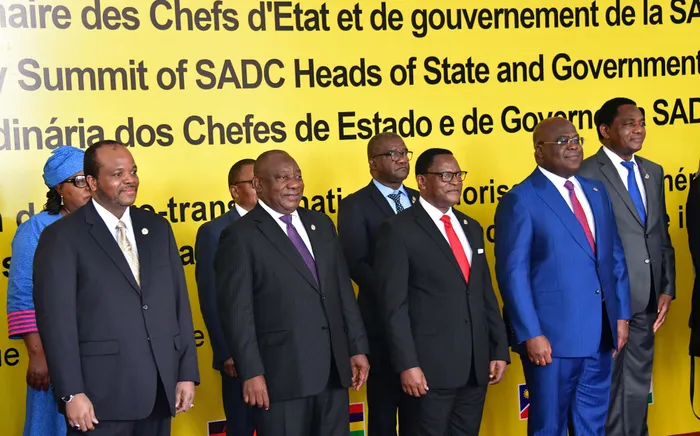Building Resilience: Is SADC Capable of Transformation?

Heads of State from the Southern African Development Community (SADC) at a special summit on the DRC crisis held in Harare, Zimbabwe recently.
Image: Elmond Jiyane/GCIS
Kim Heller
Southern Africa is caught in the shifting sands of geopolitics, regional instability, climate volatility, and sluggish economic growth. The efficacy and resilience of the regional bloc, the Southern African Development Community (SADC), are under unparalleled scrutiny.
The 45th Ordinary Summit of Heads of State and Government, set for 17 August 2025 in Antananarivo, Madagascar, could be yet another ceremonial gathering. This would be a missed opportunity, as it is vital for the regional bloc to transition from rhetoric to practical action.
Madagascar's President Andry Rajoelina will take over as SADC chairperson from Zimbabwe's President Emmerson Mnangagwa. His grand focus must be to implement the Summit's theme: "Advancing Industrialisation, Agricultural Transformation, and Energy Transition for a Resilient SADC" in a manner that is both resilient and efficient.
The economic outlook for the region is dire. The World Bank expects Sub-Saharan Africa to grow by 3.5% in 2025, but this is unlikely to drive major economic improvements or developmental progress. Extreme poverty affects 6 in 10 Southern Africans. Worryingly high youth unemployment risks further instability.
The region continues to experience significant challenges related to conflict. The peacekeeping and conflict resolution initiatives led by SADC have not met expectations. Despite SAMIM's intervention, insurgency persists in Cabo Delgado, Mozambique, displacing over a million people. Violence continues in North Kivu and Ituri, DRC.
The presence of the SADC mission failed to quell the ongoing violence. The bloc's response to the repression and banning of political parties in Eswatini received criticism. SADC's role as a defender of democracy and as a regional protector is losing legitimacy. If it is to evolve into a highly resilient regional peacemaker, SADC will need to invest in early warning systems, rapid response mechanisms, and sustainable funding, aligning efforts and resources with the African Union.
SADC's relevance will be determined by its ability to address regional crises and leverage opportunities. There are existing strategies and policies that can provide direction. The Regional Indicative Strategic Development Plan (RISDP) 2020–2030 provides a blueprint for regional industrialisation, food security, and climate resilience.
But tangible progress has often stalled due to inadequate infrastructure, including poor transport infrastructure, which limits regional trade. Supply disruptions are commonplace. Lack of economic diversification undermines sustainable development in the region, as does the overreliance on raw material exports.
The United Nations has cautioned that, although foreign direct investment is projected to increase, these inflows may not be sufficient to significantly impact unemployment, infrastructure development, or sustainable development. SADC should prioritize transforming the region into a buzzing construction site by promoting cross-border infrastructure projects and fostering regional value chains. Additionally, international investors should be encouraged to support regional infrastructure initiatives rather than focusing solely on individual country projects.
Agriculture remains the lifeline for most SADC economies. Yet across the region, the sector is weak, struck by climate shocks and underinvestment. Large-scale agricultural revival will require cooperative programmes, enhanced infrastructure, and updated production techniques.
President Rajoelina has called agriculture a "battlehorse" against poverty. But without regional dedication to this revival, the pooling of expertise and resources, agro-processing, and regional value chains, failure is inevitable.
SADC has significant renewable energy resources—hydropower in Zambia and Mozambique, wind and solar in South Africa and Namibia—but still depends heavily on fossil fuels, which may hinder a smooth transition to renewables. The energy transition demands significant investment. SADC should assess regional grid integration and evaluate its effects on job gains and losses.
The return of Donald Trump to the White House is a wild card. His administration's preference for opportunistic dip-in-and-out bilateral deals rather than broader long-term region-wide partnerships undermines regional cooperation and unity of purpose. Allowing international investors to bypass regional investment in favour of handpicked partners weakens the collective bargaining power of SADC. It also miniaturises SADC's standing on the global stage.
The path to a stronger, more unified SADC lies in a steadfast commitment to regionalism, where integration is prioritized above short-term gains or external agendas. SADC must actively push back against any external pressures that could undermine regional cooperation on economic and security matters.
The problems in the region are not new, other than the unpredictable Trump factor. The answer lies in SADC moving beyond rhetoric to real action. The tune of "deepening integration, peace, and prosperity" rings hollow in the absence of decisive implementation. SADC must prioritize unity, aligning regional and country needs, and the urgent revitalization of agriculture.
By investing in regional value chains, countries can move beyond the export of raw materials and begin to create local industries for processing, packaging, and distributing agricultural products. This would generate jobs and boost food security and sovereignty. SADC can play a vital coordination role. The path to renewable energy should be a regional rather than country-based journey.
Once again, SADC stewardship is key. A multi-dimensional approach to peacekeeping, involving early warning systems, problem-solving measures, and ongoing monitoring, can support security efforts. Regular actions aimed at maintaining regional unity and preventing fragmentation are important for sustaining the bloc's economic capacity, sovereignty, and security, and this is a key SADC deliverable.
At the 8th SADC Industrialisation Week on 29 July 2025, President Rajoelina stressed the need for the bloc to be resilient against external shocks and called for creating dignified, sustainable jobs for youth, urging preparation for a sovereign and innovative Africa.
The stakes could not be higher. The SADC of ceremonial summits and lofty declarations must transform into a SADC of resilience and efficacy. SADC solidarity in action is the only answer.
* Kim Heller is a political analyst and author of No White Lies: Black Politics and White Power in South Africa.
** The views expressed do not necessarily reflect the views of IOL, Independent Media or The African.